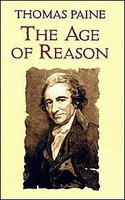 It is, however, not difficult to account for the credit that was given to the story of Jesus Christ being the son of God. He was born when the heathen mythology had still some fashion and repute in the world, and that mythology had prepared the people for the belief of such a story. Almost all the extraordinary men that lived under the heathen mythology were reputed to be the sons of some of their gods. It was not a new thing, at that time, to believe a man to have been celestially begotten; the intercourse of gods with women was then a matter of familiar opinion. Their Jupiter, according to their accounts, had cohabited with hundreds: the story, therefore, had nothing in it either new, wonderful, or obscene; it was conformable to the opinions that then prevailed among the people called Gentiles, or Mythologists, and it was those people only that believed it. The Jews who had kept strictly to the belief of one God, and no more, and who had always rejected the heathen mythology, never credited the story.
It is, however, not difficult to account for the credit that was given to the story of Jesus Christ being the son of God. He was born when the heathen mythology had still some fashion and repute in the world, and that mythology had prepared the people for the belief of such a story. Almost all the extraordinary men that lived under the heathen mythology were reputed to be the sons of some of their gods. It was not a new thing, at that time, to believe a man to have been celestially begotten; the intercourse of gods with women was then a matter of familiar opinion. Their Jupiter, according to their accounts, had cohabited with hundreds: the story, therefore, had nothing in it either new, wonderful, or obscene; it was conformable to the opinions that then prevailed among the people called Gentiles, or Mythologists, and it was those people only that believed it. The Jews who had kept strictly to the belief of one God, and no more, and who had always rejected the heathen mythology, never credited the story.It is curious to observe how the theory of what is called the Christian church sprung out of the tail of the heathen mythology. A direct incorporation took place in the first instance, by making the reputed founder to be celestially begotten. The trinity of gods that then followed was no other than a reduction of the former plurality, which was about twenty or thirty thousand: the statue of Mary succeeded the statue of Diana of Ephesus; the deification of heroes changed into the canonization of saints; the Mythologists had gods for everything; the Christian Mythologists had saints for everything; the church became as crowded with one, as the Pantheon had been with the other, and Rome was the place of both. The Christian theory is little else than the idolatry of the ancient Mythologists, accommodated to the purposes of power and revenue; and it yet remains to reason and philosophy to abolish the amphibious fraud.







7 comments:
Great quote.
I've been meaning to order some of Paine's writings for a long time. I just added Age of Reason to my Amazon wishlist.
I read Age of Reason last year after procrastinating for so long. It amazes me that he wrote what he did more than 200 years ago and that much of the book is still relevant today.
It's on my reading list... along with *so* much else. I guess I'll get around to it eventally... [grin].
cyberkitten,
You can download it from Project Gutenberg for free: click here
Thanks Merchant... I *think* I have a hard copy. It's hard to remember as I have LOTS of books I haven't read yet...... [grin]
Age of Reason was the 1st full critique of xtianity I'd ever read. What a firebrand was Paine. He had an uncanny eye for foolishness, & the courage to call it what it was.
Of course, some xtians still bandy about the rumor that he recanted on his deathbed. Ingersoll scotched that toot sweet in the 19th CE, but it persists today.
Post a Comment